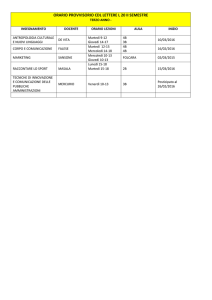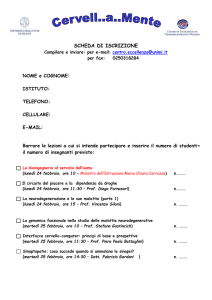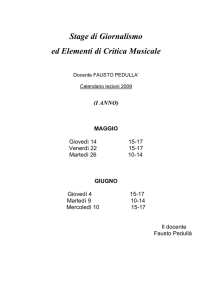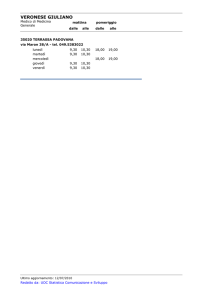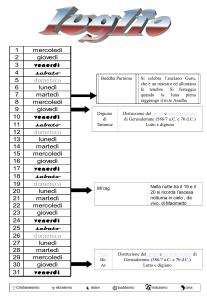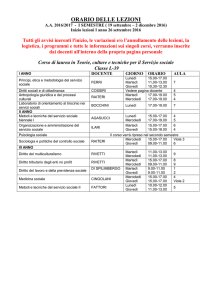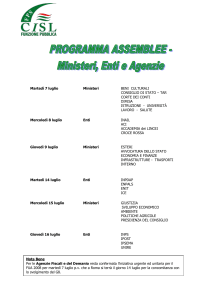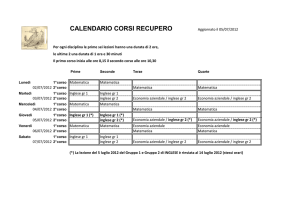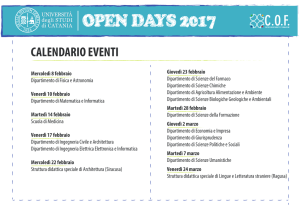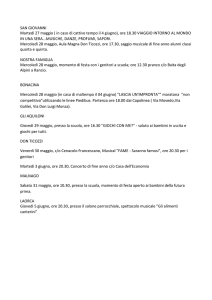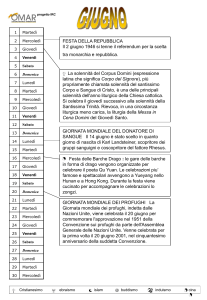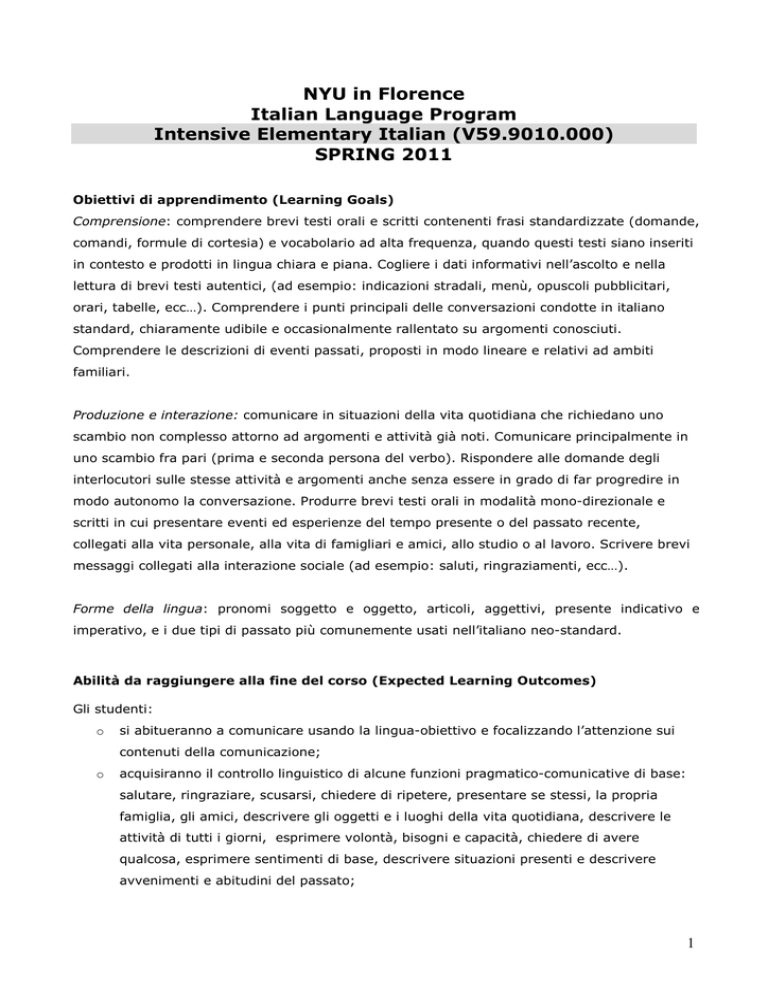
NYU in Florence
Italian Language Program
Intensive Elementary Italian (V59.9010.000)
SPRING 2011
Obiettivi di apprendimento (Learning Goals)
Comprensione: comprendere brevi testi orali e scritti contenenti frasi standardizzate (domande,
comandi, formule di cortesia) e vocabolario ad alta frequenza, quando questi testi siano inseriti
in contesto e prodotti in lingua chiara e piana. Cogliere i dati informativi nell’ascolto e nella
lettura di brevi testi autentici, (ad esempio: indicazioni stradali, menù, opuscoli pubblicitari,
orari, tabelle, ecc…). Comprendere i punti principali delle conversazioni condotte in italiano
standard, chiaramente udibile e occasionalmente rallentato su argomenti conosciuti.
Comprendere le descrizioni di eventi passati, proposti in modo lineare e relativi ad ambiti
familiari.
Produzione e interazione: comunicare in situazioni della vita quotidiana che richiedano uno
scambio non complesso attorno ad argomenti e attività già noti. Comunicare principalmente in
uno scambio fra pari (prima e seconda persona del verbo). Rispondere alle domande degli
interlocutori sulle stesse attività e argomenti anche senza essere in grado di far progredire in
modo autonomo la conversazione. Produrre brevi testi orali in modalità mono-direzionale e
scritti in cui presentare eventi ed esperienze del tempo presente o del passato recente,
collegati alla vita personale, alla vita di famigliari e amici, allo studio o al lavoro. Scrivere brevi
messaggi collegati alla interazione sociale (ad esempio: saluti, ringraziamenti, ecc…).
Forme della lingua: pronomi soggetto e oggetto, articoli, aggettivi, presente indicativo e
imperativo, e i due tipi di passato più comunemente usati nell’italiano neo-standard.
Abilità da raggiungere alla fine del corso (Expected Learning Outcomes)
Gli studenti:
o
si abitueranno a comunicare usando la lingua-obiettivo e focalizzando l’attenzione sui
contenuti della comunicazione;
o
acquisiranno il controllo linguistico di alcune funzioni pragmatico-comunicative di base:
salutare, ringraziare, scusarsi, chiedere di ripetere, presentare se stessi, la propria
famiglia, gli amici, descrivere gli oggetti e i luoghi della vita quotidiana, descrivere le
attività di tutti i giorni, esprimere volontà, bisogni e capacità, chiedere di avere
qualcosa, esprimere sentimenti di base, descrivere situazioni presenti e descrivere
avvenimenti e abitudini del passato;
1
o
impareranno a riflettere sulle costanti grammaticali della lingua acquisendo la
conoscenza delle categorie grammaticali di base come verbo, nome , aggettivo, ecc…;
o
acquisiranno le forme del verbo italiano in alcuni tempi del Modi Indicativo e nel Modo
Imperativo; acquisiranno le forme dei nomi e degli aggettivi;
o
si impadroniranno del vocabolario relativo ad alcuni domini come: identificazione
personale, tempo libero, città e luoghi di abitazione, famiglia e ambiente quotidiano,
cibi e bevande, acquisti, tempo meteorologico, viaggi e servizi;
o
sapranno preparare una presentazione orale da proporre alla classe a dimostrazione
delle emergenti abilità di comunicazione monodirezionale;
o
sapranno compilare dei brevi testi che richiedano una scrittura piana in aree relative a
bisogni pratici o che riferiscano brevi catene di eventi.
Nota: specifiche abilità pragmatico-comunicative (Expected Learning Outcomes), collegate alla
progressione di apprendimento, sono indicate in inglese nel sillabo settimanale.
Risorse testuali:
•
•
•
Oggi In Italia, Houghton Mifflin, NYU Edition (Oggi in Italia-OI e Parole per Oggi-PO).
Bookshop: Paperback Exchange, via delle Oche, 4red, Firenze
Blackboard Shell of the Course: Intensive Elementary Italian V59.9010000
Course packet
Risorse addizionali:
•
•
•
Online Audio Lab: http://library.nyu.edu/collections/ereserves.html access with your
NYU username and password
NYU Library, Villa Ulivi, ground floor
Tutoring classes, free of charge, reservation at the Villa Ulivi Reception
Risorse
testuali e
culturali
Expected Learning
Outcomes
Strutture e lessico
Compiti su
Blackboard
I settimana
31 gennaio-3
febbraio
lunedì
martedì
mercoledì
giovedì
OI, LP: pp.
2-16; L1:
pp. 18-37
PO: pp.2-8
Students will:
- use greetings,
express how they feel
and engage in both
formal and informal
introductory
conversation
- give basic
information about who
they are and where
they live
- describe personal
objects and identify
Presente di ESSERE e
AVERE. Pronomi
personali soggetto.
Genere dei nomi.
Articoli
indeterminativi.
Frasi negative.
Alfabeto.
Numeri 1-100.
Parole analoghe.
Italia e Europa.
Punti cardinali.
Cose utili.
LP/1, LP/1a,
LP/2, LP/3,
LP3a, LP4,
L1/1, L1/1a,
L1/2, L1/3,
L1/3a
2
their grammatical
gender
- make negative
statements
- spell in Italian
- demonstrate basic
knowledge of
geography of Italy and
Europe
- identify cognate
words
Vocabolario relativo a
“Presentarsi”
II settimana
7-10 febbraio
lunedì
martedì
mercoledì
giovedì:Task1
OI, L2: pp.
39-57; L3:
pp.65
PO: pp.1016
Students will:
- identify themselves
and communicate
individual
characteristics (age,
place of origin,
education, profession)
- ask about time
- use the gender of
Italian words and
articles
- express basic wants
and needs
Genere e numero
degli articoli
determinativi.
Possessivi.
Materie
insegnamento.
Che ora è?
Espressioni con
AVERE.
Vocabolario relativo
alla identificazione
personale: “Che cosa
fai?”
L2/2, L2/2a,
L2/3a, L2/4,
L2/4a,
III settimana
14-17 febbraio
lunedì
martedì
mercoledì
giovedì: Quiz1
IV settimana
21-24 febbraio
lunedì
martedì
mercoledì
giovedì:Task2
OI, L3:
pp.66-67;
L4: pp. 80102; L5:
pp.115-117
PO: pp.1826
Students will:
- talk about plans for
social activities
- talk about plans for
specific days of the
week and times of the
day
- use the present
tense
- ask questions with
proper intonation and
use the main
interrogative words
- use basic idiomatic
expressions with the
verb FARE
Verbi in –ARE, in –
ERE, in –IRE.
Frasi interrogative.
Verbi FARE - DARE –
STARE: forme e uso.
Students will:
- specify locations
with simple and
combined prepositions
- ask directions to get
oriented
- discuss travel plans
- talk about their
apartment and their
Preposizioni semplici
e articolate.
Espressioni C’È, CI
SONO, ECCO.
Verbi ANDARE –
VENIRE.
Giorni della
settimana.
Parti della giornata
Alcune espressioni di
tempo.
Vocabolario relativo a
“Sport e tempo
libero”.
L3/2 , L4/1,
L4/2, L4/3,
L5/3
Iniziano
incontri
Tandem
OI, L3: pp.
59-64, pp.
71-79; L5:
pp. 118119
PO: pp.2844
L3/1, L3/3,
L3/4, L3/5,
L3/5a, L4/4,
L4/4a
Vocabolario relativo a
“La città e la casa”.
3
Escursione
friend’s apartment
- use some highfrequency irregular
verbs
V settimana
28 febbraio3marzo
lunedì
martedì
mercoledì
giovedì: Quiz2
OI, L5: pp.
104-115,
pp. 120124; L6:
pp. 126138
PO: pp.4655
VI settimana
ESAMI DI
MIDTERM
7-10 marzo
lunedì
martedì
mercoledì
giovedì
Students will:
- describe
characteristics of
people, places and
objects
- begin to talk about
past actions and
events
- express dates and
talk about seasons
Aggettivi
qualificativi: genere e
numero. Posizione
degli aggettivi con i
nomi.
Passato prossimo con
ausiliari ESSERE e
AVERE: forme e uso.
Vocabolario relativo
a: “Descrizione fisica
e del carattere”.
Stagioni e mesi.
Espressioni di tempo
al passato.
L5/1, L5/1a,
L5/2, L5/4,
L6/1, L6/1a,
L/6/2, L6/3,
L6/4b
Ripasso
Esame orale
Esame scritto
SPRING
BREAK
14-18 marzo
VII settimana
21-24 marzo
lunedì
martedì
mercoledì
giovedì:
Task3
OI, L6: pp.
139-147
PO:57-64
Escursione
Students will:
- talk more
extensively about past
actions and events
- write short essay
about past events
- describe their family
and the family of their
class mates
- use some highfrequency irregular
verbs to describe
behaviour and past
action
Participi passati
irregolari.
Verbi BERE – DIRE –
USCIRE al presente e
al passato prossimo.
L6/4a
Vocabolario relativo
a: “La famiglia”.
VIII settimana
28-31 marzo
lunedì
martedì
mercoledì
OI, L7: pp.
149-155;
pp. 159-
Students will:
- use formal and
informal commands
Imperativo: forme e
uso.
Preposizione DI per
L7/1, L7/2,
L7/2a, L7/4,
L7/6, L7/7,
4
giovedì: Quiz3
171
PO: pp. 7686
for orders and advice
- learn how to interact
while grocery
shopping using
partitive quantities
and larger numerals
- talk about eating
habits.
esprimere il partitivo.
I numeri sopra i 100.
Vocabolario relativo
a: “Mangiare e bere”.
IX settimana
4-7 aprile
lunedì
martedì
mercoledì
giovedì:Task4
OI, L7: pp.
156-158;
OI, L8: pp.
173-179
PO: pp. 8898
Students will:
- discuss and compare
their daily routine
- learn how to interact
in standard shopping
situations
- talk about fashion
- talk about travelling
- talk about family
Verbi riflessivi: forme
e uso
Vocabolario relativo
a: “La moda” e a fare
acquisti.
Introduzione di
vocabolario su “Lei
viaggia?”.
Approfondimento di
vocabolario su “La
famiglia e i parenti”.
L7/3, L7/3a,
L7/5, L8/1,
L8/1a
Students will
participate in field
trips about Italian
language and
Culture
VENERDì
ITALIANO
8 aprile
X settimana
11-14 aprile
OI, L8: pp.
173-194
lunedì
martedì
mercoledì
giovedì: Quiz4
PO: pp. 6674
Escursione
Students will:
- communicate basic
duty, will, and ability
- refer to prior
sentences and objects
using pronouns
- use contrastively
high-frequency
demonstratives
- talk about jobs and
educational goals
Verbi DOVERE –
POTERE – VOLERE.
Pronomi diretti.
Accordo di
LO/LA/LI/LE con il
participio passato.
Aggettivi
dimostrativi:
QUESTO e QUELLO.
L8/2, L8/3,
L8/4, L8/5,
L8/5a/L8/6,
L8/7
Vocabolario relativo
a: “Lavoro e
professioni”.
XI settimana
18-21 aprile
lunedì
martedì
mercoledì
giovedì:Task5
OI, L9: pp.
196-209,
pp. 212217
PO:
pp.100-108
Escursione
Students will:
- describe past
actions and events
without regard to their
temporal limits
- describe how often
certain events occur
using appropriate
temporal markers
- talk about the
present and the past
weather
- describe the
Imperfetto: forme e
uso.
Espressioni negative.
Che tempo fa?
Alcune espressioni di
tempo.
Vocabolario relativo
a: “La natura e il
mondo intorno a
noi”.
L9/1, L9/2,
L/9/3, L9/4,
L10/1
5
characteristics of the
natural environment
XII settimana
26-28 aprile
lunedì (NO
class: Italian
Holiday)
martedì
mercoledì
giovedì
OI, L9: pp.
210-211;
OI, L10:
pp. 219229
PO: pp.
110-117
Students will:
- communicate both
descriptive and factual
past events
- report the events in
short written texts
- talk about traveling
and trips
Forma tonica dei
pronomi personali.
Contrasto passato
prossimo-imperfetto.
Approfondimento di
vocabolario su
“L’abbigliamento, i
tessuti e i colori”.
Introduzione di
vocabolario su “Il
cinema”.
Vocabolario relativo
a: “Viaggi e turismo”.
L9/5, L10/2,
L10/2a,
L10/3,
XIII settimana
2-5 maggio
lunedì: Task6
martedì
mercoledì
giovedì: Quiz5
OI, L10:
pp.230-240
Students will:
- talk about people,
places and things they
know
- review and broaden
some points of their
linguistic and
communicative
competence
- prepare an oral
presentation
Particolarità del
plurale di alcuni nomi
e aggettivi.
Verbi SAPERE e
CONOSCERE: forme
e uso.
L10/A, L10/5,
L10/6
XIV settimana
ESAMI
FINALI
9-12 maggio
lunedì
martedì
mercoledì
giovedì
Ripasso generale
Esami finali
GRADE BREAKDOWN
Task
25%
Quiz
10%
Attendance
10%
Participation & Homework
20%
Midterm
15%
Final
20%
NOTE: Instructors may vary slightly the syllabus to meet the needs of each individual class
IMPORTANT CLASS RULES
• ATTENDACE is mandatory and the absences will affect negatively your grade. If you
intend to observe a religious holiday, you must notify the instructor one week in
advanced.
6
•
Please remember that you are in Florence to learn Italian language and culture, so
ITALIAN WILL BE SPOKEN in class at all times.
HOMEWORK and PARTICIPATION
•
•
•
•
All homework will be turned in on the due date. Should you be unable to make it to a
class, it is your responsibility to see that the homework reaches the instructor on the
designated date. Failure to complete homework assignments or to deliver them on
time will lower your grade.
Using old textbooks with the answers in them is a question of academic honesty and
will be regarded by your instructor as a cheating issue affecting negatively your grade.
Coming prepared having done the assignments, forcing yourself to speak constantly
Italian, asking questions, participating in all activities with a positive attitude, all of
them are criteria in assessing your own class participation.
For detailed policy about ATTENDANCE, PARTICIPATION, PLAGIARISM AND CHEATING,
please see the Blackboard Shell of your Italian Course.
QUIZ AND EXAM
•
•
•
All TESTS will be taken as scheduled.
EXAMINATIONS may be made up or anticipated only by permission of the Office of
Academic Support, Villa Ulivi.
Travel arrangements will never constitute a satisfactory excuse for requesting an early
or make-up exam.
NOTE!
No food and beverage, except water, is allowed in the classroom.
7


